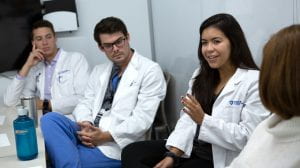
At Penn State College of Medicine, Health Humanities is one of four educational pillars, along with Biomedical Sciences, Clinical Sciences, and Health Systems Sciences, and is integrated into all phases of medical education. Focusing on the sociocultural and affective contexts of clinical medicine, as well as ethical behavior and interpretive skills, Humanities courses prepare students for humanistic practice and enhance habits of lifelong learning, curiosity, creativity, and critical thinking.
Phase 1:
Foundations of Health Humanities (FHH):
Foundations of Health Humanities serves as the gateway for Humanities learning at Penn State College of Medicine, introducing the social construction framework. Social construction addresses the role of the social context in shaping human experience, including health, illness, and medicine. Employing tools from anthropology, literary study, comics, film, and history, FHH focuses topically on race, disability, gender, sexuality, and bias. With its small-group format and attention to the dialogue space of learning, FHH provides a basis for developing strong interpersonal professional skills.
Observation and Interpretation (O&I):
Observation and Interpretation provides a unique opportunity for students to develop observational skills and careful reasoning through encounters with fine arts and clinical images. The course focuses students’ attention on crucial components of medical decision making: identifying key pieces of data, pattern recognition, and interpretation and reinterpretation of both data and patterns. In O&I, learners are challenged to refine their observational and analytical skills and communicate their impressions and findings to others in a process similar to differential diagnosis.
Humanities in Context (HIC):
Humanistic practice requires the ability to navigate complexity and uncertainty and understand the experiences of doctors and patients within the societal contexts of medicine. The course includes two content cores—Patient and Doctor in Society and Ethics. In the Patient and Doctor in Society core, HIC includes topics such as weight bias, emotions in medicine, mindfulness, resilience, intersectionality, and narrative medicine. During the Ethics core, students learn key concepts and skills with regard to end-of-life care, informed consent, autonomy and beneficence, futility, and confidentiality.
Communication:
The Communication course is the final course in the Humanities pre-clerkship curriculum. The course is a practical introduction to patient-centered communication, designed around a framework of six functions: fostering healing relationships, exchanging information, making decisions, enabling patient self-management, responding to emotions, and managing uncertainty. The course utilizes Standardized Patient interactions to allow students to practice communication skills with immediate feedback.
Phase 2:
Humanities Across Clerkships (HAC):
Humanities Across Clerkships is a longitudinal course for students during the required clerkships of Phase II. In HAC, students reflect on issues encountered in the clinical learning environment, focusing on those related to Humanities and career development. The small-group format and emphasis on peer and near-peer learning prioritize working together to support professional identity formation, debrief clinical experiences and challenges, and further develop critical skills in self-reflection.
Phase 3:
Humanities Seminar Selectives (HSS):
Humanities Seminar Selectives are required capstone courses for the Health Humanities Pillar and provide a context for students to further develop humanities knowledge and humanistic skills. These interdisciplinary seminars are based in humanities, social science, or arts disciplines and meet for 20 contact hours, usually during one block of Phase III. Every seminar focuses on a different topic or discipline; students select one that fits their schedule and interests to meet the requirement.
Humanities Pillar and provide a context for students to further develop humanities knowledge and humanistic skills. These interdisciplinary seminars are based in humanities, social science, or arts disciplines and meet for 20 contact hours, usually during one block of Phase III. Every seminar focuses on a different topic or discipline; students select one that fits their schedule and interests to meet the requirement.
Each course is structured to meet these goals:
• Integrate humanities scholarship with the practice of medicine
• Deepen and extend students’ humanities scholarly knowledge
• Reflect on professional identity development
• Engage in critical thinking, and
• Integrate cognitive and affective responses to course materials
Systems-Conscious and Humanistic Medicine (SCHM):
This course revisits key systems science and humanities concepts in the context of clerkships, while also preparing students for the UME to GME transition. Students will engage in Morbidity and Mortality (M&M) conferences and analyze each M&M case from a systems and humanities lens. Students will also practice advanced clinical skills that require excellence in humanities and systems domains, such as how to perform quality improvement projects, effectively transition care of a patient, place orders and call consults, organize a team in urgent care situations, and engage in an informed consent dialogue. The course also includes instruction about applying to residency programs.
Medical Student Research (MSR)
Humanities faculty serve as advisors for MSR projects that involve scholarly themes related to health humanities. Faculty expertise includes medical anthropology, ethnography, literary studies, comics and medicine, clinical ethics, research ethics, public policy, medical controversy, feminist and cultural studies, and medical education research. Students pursuing MSR projects in Humanities often undertake original projects or join departmental research teams. Specific research topics of current faculty include AI, vaccination, gender, ageing, deaths of despair, child abuse, global health tourism, creative writing, ELSI (ethical, legal, and social implications) of genetics, race and social injustice, humanities in medical education, and graphic medicine. Students interested in pursuing an MSR project in Humanities can contact the department for research opportunities.


